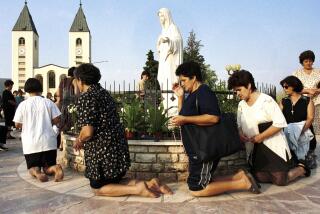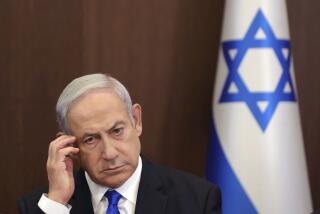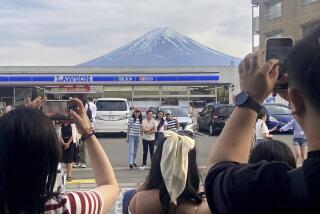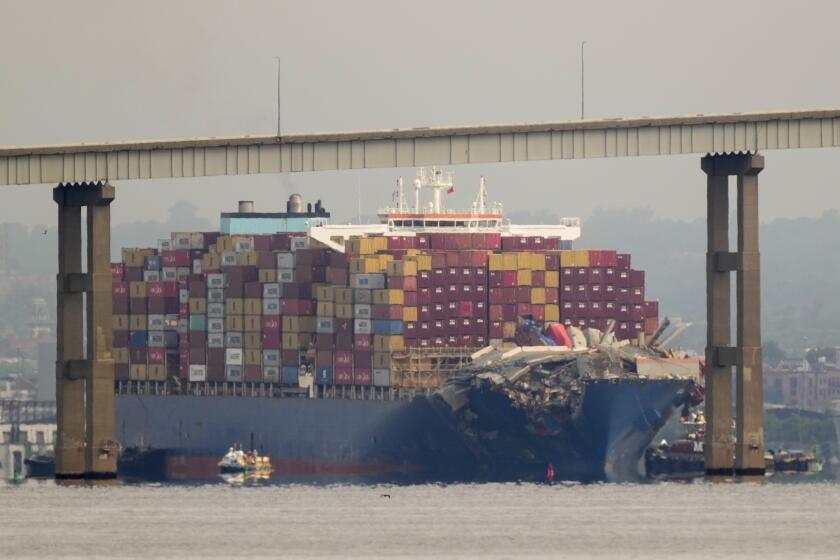Arab Neighbors Grieve With Kibbutzniks for Slain
For years they drank from the same well, and on Monday they shared the bitter drink of mourning.
An Israeli communal farm regarded as an emblem of Jewish-Arab coexistence grieved for five people, including a mother and her two small boys, shot dead in a rampage Sunday night by a suspected Palestinian gunman who then escaped into the surrounding shrubby hills.
From across orchards and olive groves, Arab neighbors came to Kibbutz Metzer to express their sorrow -- and their fears that a friendship of generations’ standing, a rarity in these violent days, could be jeopardized by the bloody events of the night before.
“We are as close as brothers,” said Adha Taher, 49, who led a delegation of elders from the adjoining Israeli Arab village of Mesar, many of them clad in traditional robes and white headdresses, to offer condolences to red-eyed kibbutzniks. “How could this have happened?”
Kibbutz Metzer, founded in Israel’s early years of statehood by mainly Argentine immigrants, has long been a bastion of leftist politics and activism in the country’s peace movement.
From the hardscrabble years when the kibbutz was little more than a scattering of tents on a bare hillside, its members shared a water source and agricultural know-how with Arab neighbors, a tradition that continues to this day.
Prime Minister Ariel Sharon, who visited the kibbutz in the attack’s aftermath, promised that those who orchestrated and carried out the infiltration would pay a heavy price.
“What we saw here today is yet another example of the people we are confronting,” he said -- a view many kibbutz residents deplored as a smear against all Arabs.
Home to 450 Israelis who farm the land, raise dairy cows and run a small fitted-pipe factory, Kibbutz Metzer lies less than half a mile from the border with the northern West Bank, the attacker’s suspected entry point.
Early today, the army reported it had arrested two wanted Palestinian men near the West Bank city of Tulkarm and destroyed the home of a militant leader blamed for the attack. Palestinians in the Tulkarm refugee camp said Israeli tanks moved in before dawn. The military was also expected to tighten its grip on Nablus.
The move into the camp came just hours after Israeli soldiers killed a 2-year-old boy and wounded two other children at the Rafah refugee camp in the Gaza Strip, witnesses and hospital officials said. The army said that troops had responded to shots fired at them and that it was unaware of casualties.
After the kibbutz slayings, Foreign Minister Benjamin Netanyahu, who took up his post in Sharon’s government less than a week ago, called for the removal of what he labeled the “terror regime” of Palestinian Authority President Yasser Arafat.
However, he told Israel’s Army Radio that the timing of such a step would depend on “international developments,” an apparent reference to momentum building toward an American strike against Iraq’s Saddam Hussein.
The Bush administration has made it clear to Israel that any unwarranted escalation of the conflict with the Palestinians at this delicate time would be extremely unwelcome.
Arafat condemned the Kibbutz Metzer attack, but the Al Aqsa Martyrs Brigade, a Palestinian militant group linked to his Fatah faction, claimed responsibility for the shootings.
In both Israel and the Palestinian territories, more than 25 months of bloodletting has diminished the shock effect of even the most violent deaths.
But the killings at the kibbutz struck a chord across Israel.
Television viewers witnessed a wrenching display of grief by Avi Ohayon, father of Noam and Matan, boys of 4 and 5 who were shot dead as they tried to hide under their covers.
Their 34-year-old mother, Revital, Ohayon’s ex-wife, died while trying to block the gunman in the bedroom doorway.
“My soul, my soul!” Ohayon sobbed as he collapsed on the children’s mattress hours after the killing, surrounded by his sons’ toys. His weeping grew desperate when he spotted a pacifier that he had sometimes teased Matan for still using.
Revital Ohayon had called her former husband shortly before midnight to say that she heard gunfire outside. While she was on the line, the gunman burst into the one-story stucco house.
“I heard the shot and my children screaming -- can you begin to comprehend what that meant to me?” Avi Ohayon said in a raw-voiced interview with Israel’s Channel Two.
Revital Ohayon, a schoolteacher, had moved to the kibbutz three months earlier because she felt it would be a good home for the boys.
On the covered porch of the house, the children’s pets were still in their cage, and laundry -- almost all small shirts and socks -- was drying on a rack.
Also killed in the attack were the kibbutz’s general secretary, 44-year-old Yitzhak Dori, and 42-year-old Tirtza Damari, who was visiting her boyfriend, a member of the kibbutz. Thousands of people, many of them from kibbutzim all over Israel, converged on the small community for Dori’s funeral Monday afternoon. Although the kibbutz movement in recent years has been struggling financially and suffering from declining membership, many Israelis regard the collective agricultural settlements as a national emblem and consider the movement’s ideals as having been a crucial force in shaping the character of their state.
Kibbutz Metzer lies in Israel’s narrowest point -- a “waist” of only about 10 miles between the West Bank and the Mediterranean. The corridor has been the scene of a series of attacks by militant groups, including a bus bombing only a few miles from the kibbutz Oct. 21 that killed 14 people.
In an even closer brush, a car carrying two Palestinians blew up Sunday at midday almost at the gates of the kibbutz, killing the two men inside, after police spotted the vehicle and shouted at the driver to stop.
The kibbutz is surrounded by an ordinary wire fence. Residents of the lightly guarded community said they had always felt a measure of safety -- in large part, they said, because of the warm relations cultivated over decades with their Arab neighbors, in Mesar on the Israeli side and in Palestinian villages across the border in the West Bank.
This month, kibbutz residents filed a legal complaint against plans for a security fence between Israel and the West Bank, objecting to the fact that the barrier would have cut through olive groves belonging to Palestinian villages in the West Bank. They wanted the fence line redrawn to leave the groves intact on the other side.
“These were our founding principles -- tolerance and egalitarianism, a view of our neighbors as people and equals,” said Dov Avital, who has lived in Kibbutz Metzer for 14 years. “And we cannot abandon those ideals now, only because of this terrible thing.”
More to Read
Start your day right
Sign up for Essential California for news, features and recommendations from the L.A. Times and beyond in your inbox six days a week.
You may occasionally receive promotional content from the Los Angeles Times.






